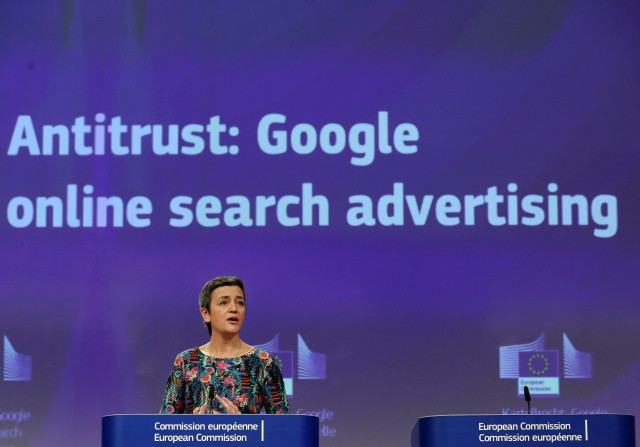The European Union fined Google with US$1.7 billion or €1.49 billion for breaching antitrust regulations in the online advertising market. EU stated that the American tech company abused its market dominance through enacting restrictive clauses in agreements with third-party sites that blocked Google's competitors from placing their search ads on websites.
On Wednesday, March 20, the European Commission published a press release and it outlined why it is penalizing Google with a hefty fine. Commissioner Margrethe Vestager who is in charge of the competition policy stated the tech company violated some rules and engaged in illegal practices by laying down unfair terms on companies that utilize its search bar in Europe.
"Today the Commission has fined Google €1.49 billion for illegal misuse of its dominant position in the market for the brokering of online search adverts," she said in a statement via the press release. "Google has cemented its dominance in online search adverts and shielded itself from competitive pressure by imposing anti-competitive contractual restrictions on third-party websites. This is illegal under EU antitrust rules."
The commissioner also stated that Google's misconduct lasted for more than 10 years and during that time, it disallowed the chance for many companies to "compete on the merits and to innovate - and consumers the benefits of competition."
At a separate news conference in Brussels, Vestager concluded, "There was no reason for Google to include these restrictive clauses in its contracts, except to keep its rivals out of the market."
As CNN News noted, since 2017, this is the third fine imposed by the EU against Google for antitrust breach. With the new penalty, EU's fines against Google now totaled to about US$9.3 billion or €8.2 billion. Then again, the association has not received a single penny yet because Google is still appealing its first two cases and mulling if it will also appeal the Wednesday's ruling fine or not.
With its continuous crack on violators and firmly reinforcing its stand on the matters of antitrust, the European Union has been described as the "world's most aggressive watchdog of an industry with an increasingly powerful role in society and the global economy."
The antitrust cases of Google show that policymakers need to monitor the digital economy more thoroughly. As the former antitrust official in the Justice Department, Gene Kimmelman, said via The New York Times, there is a need to improve the regulations.
"As it becomes increasingly clear that antitrust fines or after-the-fact remedies are not enough to bring vibrant competition to the market, governments will need to move to deeper tech sector regulation to remedy problems," he said.





